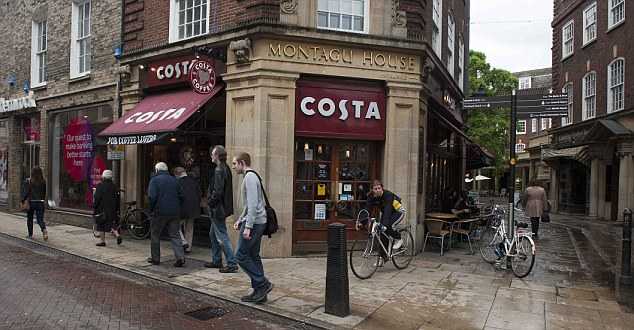LONDON, UK – The British Coffee Association (BCA) has released new figures on coffee consumption across the nation ahead of this year’s UK Coffee Week, a nationwide celebration of coffee that unites the industry to raise funds for the communities that grow our coffee.
The research, conducted by the Centre for Economics and Business Research (CEBR), found the UK’s coffee consumption has soared to 95 million cups a day in 20182, up from 70 million in 20081, suggesting an increase of 25 million over the last 10 years.
So where do we drink our coffee, and who drinks the most?
Part of the research included a survey of 2,000 adults in the UK. Nearly a third of people surveyed indicated they don’t drink coffee at all, but at the other end of the scale, 6% said they drank six or more cups a day, with the average person consuming around two cups a day.
Of the coffee consumed in the UK, on average, 65% was consumed at home, 25% was consumed at work or whilst studying, with the remaining 10% being consumed in coffee in shops, bars and restaurants.2
A nation of seasoned coffee connoisseurs
Chris Stemman, Executive Director of the BCA, says “In the last decade we’ve gone from a country of tea sippers who enjoy the occasional instant coffee, to a nation of seasoned coffee connoisseurs exploring a large variety of roast and ground blends. Coffee consumption has boomed across the UK and with so many choices on offer, both at home and on the high street, this increase is not surprising.”
Despite the fact there has been a growing increase in the consumption of fresh ground coffee, instant coffee still tops the list for our favourite type of coffee by a significant margin.
Although as a nation we consume around two cups a day, the average number varied amongst the age groups:2
- Generation Z (<20) – 0.5 cups a day
- Millennials (20-37) – 1.3 cups a day
- Generation X (38-52) – 2.1 cups a day
- Baby Boomers (53-71) – 2.2 cups a day
- Traditionalists (72+) – 2.2 cups a day
Further analysis of the data showed Millennials (20-37) contributed to 50% of all the coffee consumed in coffee shops, bars or restaurants, compared to 25% of Generation X (38-53) and only 12% of those over the age of 72. On the other hand, Millennials were least likely to drink their coffee at home (18%) compared to the over `72-year olds who made up almost a third of at home coffee drinkers.2
Younger generations are bucking the trends
Commenting on the research, Stemman added: “It’s interesting to see the significant differences in consumption trends amongst the age groups. The research suggests that whilst Millennials are drinking slightly less coffee than the older generations, they are probably drinking more of the speciality coffee found in restaurants, bars and coffee shops, which are often higher value, and are therefore more of a treat.
“We have historically been a nation of instant coffee drinkers over and above other types of coffee and the research suggests that this may remain the case for the older generations. As for the younger generation, they seem to be bucking the trend and are perhaps taking a more connoisseurial approach to coffee drinking.”
The research also found that, on average, women consume slightly less coffee than men who make up 54% of the coffee drinkers in the UK vs 46% for women.
Dr. Sarah Jarvis, Clinical Director of Patient.info, says, “Despite the fact that we’re clearly enjoying coffee more than ever before, it’s still reassuring to know that coffee is one of the most well researched products in the world when it comes to our health.
There is clear evidence to show that in moderation, around 3 to 5 cups per day for most people (around 400mg of caffeine), coffee can contribute to a healthy, balanced diet3.
Coffee is also associated with certain health benefits such as improving alertness, physical performance levels, decreasing risk of cognitive decline and even reducing risks of some cancers. Of course, there are certain people who should limit their caffeine consumption, including those who are pregnant (less than 200mg per day)3,but for most of us, we can continue drinking coffee in moderation quite happily.”
Five things you didn’t know about coffee:
- It takes 42 coffee beans to make single shot of coffee
- Coffee is actually a seed, not a bean! They are commonly called beans because of their resemblance to beans
- Coffee was originally eaten, rather than drunk, it wasn’t until the 13th century that people began to roast coffee beans
- Coffee comes from a red cherry-like fruit which is grown on bushes
- Robusta and Arabica are the two beans that make up almost all the coffee we consumer in the UK. Arabica has a slightly lower caffeine content than Robusta and prefers to be grown at higher altitudes. Robusta meanwhile grows at lower altitudes and has a slightly more bitter taste.
References
- Mintel, Coffee UK, 2008 Report
- CEBR, The UK Coffee Market and its impact on the economy, 2018 Report
- EFSA (2015) Scientific Opinion on the Safety of Caffeine, EFSA Journal, 13(5):4102


















